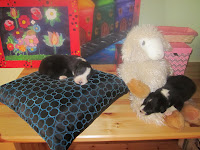To ensure that your puppy is healthy and vigorous you need to get him/her vaccinated. The puppy needs to be protected against the many diseases he/she could pick up. The first set off vaccines are given at 6 to 8 weeks and the second at 10 to 12 weeks. If you are planing on bringing your puppy out of Ireland he/she will need the rabies vaccine which is given at 12 weeks. It usually takes 14 days after the vaccination for the puppy to be fully protected from the disease. Some puppies can still get the diseases that they were vacinated against. The most common reason is the maternal antibodies interfering with the vaccine also it could be genetic, a problem with the vaccine itself or the puppies immune system. All puppies are given the same dose. You must also ensure that you partake in year round protection of your puppy from fleas, ticks, worms and parasites.
- 6 to 8 weeks- Get full check up from vet - 1st DHPP-Distemper, Hepatitis, Parainfulenza, Parovirus. Also get a fecal sample for parasites.
- 10 to 12 weeks- Get full check up from vet- 2nd DHPP. Leptospirosis 1st and Lyme 1st if in risk group.
- 16 weeks- 3rd DHPP.Boster for lepospirosis and lyme.Get full check up from vet.
































